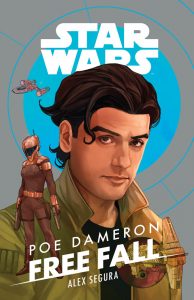“What’s in there?”
“Only what you take with you.”
 Neither Yoda nor Luke Skywalker make an appearance in Poe Dameron: Free Fall by Alex Segura yet those are the words that kept echoing through my head the entire time I was reading the book. With the exception of the novelizations, Free Fall is the first book published after The Rise of Skywalker to intimately deal with one of the Sequel Trilogy’s major characters. I bring this up mostly because I suspect that many readers won’t just bring their personal feelings about Poe Dameron to the book but more specifically, their feelings about how The Rise of Skywalker handled the x-wing flyboy.
Neither Yoda nor Luke Skywalker make an appearance in Poe Dameron: Free Fall by Alex Segura yet those are the words that kept echoing through my head the entire time I was reading the book. With the exception of the novelizations, Free Fall is the first book published after The Rise of Skywalker to intimately deal with one of the Sequel Trilogy’s major characters. I bring this up mostly because I suspect that many readers won’t just bring their personal feelings about Poe Dameron to the book but more specifically, their feelings about how The Rise of Skywalker handled the x-wing flyboy.
Everything isn’t great on Yavin 4 if your last name is Dameron. The relationship between sixteen-year-old Poe and his father Kes has been somewhat fraught since the death of his mother Shara Bey years ago. When Poe’s latest joyride ends in disaster, he finds himself in need of a change. He just didn’t quite expect that change to be piloting a ship for the Spice Runners of Kijimi and all the trouble that comes with it. And he really didn’t expect to end developing a connecting with fellow young Spice Runner Zorii Wynn.
This isn’t the sort of review I particularly enjoy writing because the phrase ‘it’s fine’ is what immediately came to mind when someone asked how I felt about Free Fall. Those two words feel like the epitome of damning with faint praise, which I certainly don’t mean to do. Segura did fairly well with the hand he was dealt here because the bulk of what made me struggle with this book were elements introduced by The Rise of Skywalker. Poe Dameron as a spice runner is just something I have not been able to come to terms with yet. It’s not something that feels like it jives with the Poe we got to know in the first two films and the other books and comics.
The other thing I brought into the book with me was a completely different headcanon regarding Kes Dameron, how he dealt with Shara’s death, and his subsequently relationship with his son. Again, this is very much a personal problem that is not exactly the fault of the book but it was still a hurdle it had to clear. And ultimately, I’m not entirely sure that it did clear it or that I’ve come to terms with it. This is probably not something that’ll bother most readers but if you’ve ever devoted a significant amount of time to speculating about the Bey-Dameron family… it might.
On the other hand, teenage rebellion via running off to join smugglers does feel very Star Wars. Segura does a good job letting both Poe and Zorii feel like teenagers even though they’re definitely not in typical teenager situations. Seeing the relationship between them and how things ultimately go wrong adds a new depth to their scenes together in The Rise of Skywalker. If anything, this book makes me want to read more about Zorii especially after this book ends because there are definitely stories to be told there and I want them.
Oh! The one no-strings attached piece of high praise that I definitely can give this book is that I finally get why everyone loves Babu Frik. He only has a few scenes but every single one of them is a genuine delight and I would also like Babu Frik to be my friend and help me with my problems.
Could I write more words about this book? Probably yes but ultimately, I think they’ll boil down to this: your enjoyment of Poe Dameron: Free Fall is going to depend greatly on how you felt about the introduction of his spice runner history, Zorii Bliss, and how much of your brain you’ve dedicated to musing about the Bey-Dameron family since 2015. Regardless of how you feel about those three things, I do think Free Fall is worth giving a shot if you’re a fan of Poe and I certainly wouldn’t mind seeing future Star Wars books from Segura in the future.
Thank you to Disney Lucasfilm Press for providing an advance copy of the book for review purposes.

